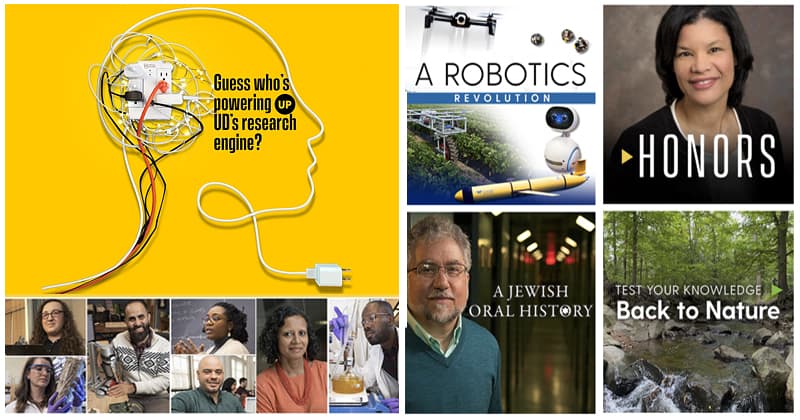RESEARCH
DISCOVERY
A Blog Devoted to UD Innovation, Excellence & Scholarship
RESEARCH OFFICE
Powering up UD’s research engine

Graduate students are a vital part of what keeps the University of Delaware research enterprise humming along. The new issue of UD Research magazine highlights a few of our graduate students and postdoctoral researchers and the projects they are pursuing across the sciences and humanities.
The University of Delaware has many agents of intellectual prowess and the new, all-digital issue of UD’s Research magazine gives you new perspectives on the challenges and rewards of their work.
“Our research community inspires unwavering ambition to move beyond these challenging days of the pandemic toward a brighter, more equitable future,” said Charles G. Riordan, vice president for research, scholarship and innovation.
“At UD, research never stops.”
This issue puts the spotlight on UD’s graduate students, an essential group of researchers who come from around the world, bringing fresh energy, diverse perspectives and new angles to their studies at the master’s and doctoral levels. They inspire new collaborative projects and provide important guidance and mentorship to emerging researchers.
“It is their passion and energy that — with mentorship and guidance — pave new avenues of discovery,” said Lou Rossi, dean of UD’s new Graduate College and vice provost of graduate and professional education.
We introduce you to several of these students and their fascinating projects in this issue.
Check out our special section on UD’s growing muscle in robotics, too. There, you’ll see how UD researchers are using robots in service to society — on land, in the air and under the sea — with video integrated throughout.
Mechanical engineering Assistant Professor Sambeeta “Sam” Das, for example, is working on infinitesimally small, self-driving microrobots that can deliver drugs directly to diseased cells and also make artificial organs. Others are conducting equally transformative research with the potential to address global challenges in agriculture, climate change, cybersecurity, health care, physical therapy, search-and-rescue efforts, stroke rehabilitation and more.




